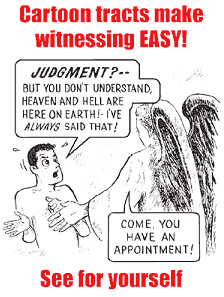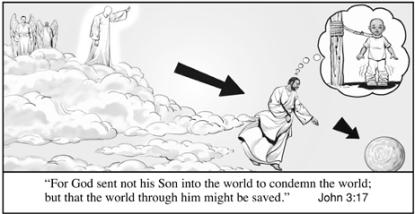I’m the son of a Baptist (formerly Southern B.) preacher. I know a thing or three about fundamentalists, even though my family never qualified for that moniker. Now comes proof of something fundamentalists can’t fathom that seems obvious to the rest of us, even those of us who are accustomed to their world-view (not that I agree with it–me, I like evolution just fine, though I hold more closely to the ideas of devolution).
I always thought the fundamentalist habit of "witnessing" (that would be when the guy in line behind you at McDonald’s starts an awkward conversation with you, then in about 30 seconds says, "Do you know Jesus?" even though he doesn’t know anything about you) was counter-productive. It’s also the school of thought that produces Chick tracts, those weird little cartoon booklets designed to scare the hell out of you for, usually: a) living the rock and roll lifestyle, b) being Catholic, or c) dressing like a pimp.
Here are some sample panels for you:


They contain a generic prayer at the end–intone it, it promises, and you’re stepping off the hell express, right into well-scrubbed Ned Flanders-ville. Theology for those who need instructions to make toast?
It might seem obvious to those of us who are not fundamentalists that these methods generally only appeal to a very small, very vulnerable segment of the population. It might seem obvious that high on the list of "How to Win Friends and Influence People" is not "employ strange, frightening methods to make them convert to the religion of your choice." It might seem obvious that 99% of the targets of such manipulation will immediately develop an intense dislike for and mistrust of anybody who asks them if they know Jesus. These people are doing terrible things to the belief system I personally value, which is heavy on the Golden Rule and light on all the smiting.
This group of fundamentalist folks, as a lot of us now can see, decided to invade politics starting in the ’80s. The results have been very, very ugly, and flown in the face of our Constitution, which, as Northampton author Frederick Clarkson has repeatedly and rightly pointed out, was precisely written (see Article 6, naysayers) to cut theocracy, then rampant in the colonies, right out of government. They also brought us, with the help of the main matchmaker of church-state romance, Karl Rove, George W. Bush. When we ask, "How did this bristly, unpleasant excuse for a man become front man for the neo-cons?" we can thank the Republicans of the far right, those same fundamentalists who ask you if you know Jesus while slapping extra mayo on a burger.
If you’re wondering how that whole evangelical emphasis is working out these days, well, it seems to have gone down the drain ever since they took to taking over government instead of souls. Of course, Jesus told them: "Render unto Caesar what is Caesar’s, and unto God what is God’s." Then there was the whole throwing the moneychangers out of the temple thing. I guess they skipped that part of the Bible. They seem to prefer smiting and vengeful gods to loving thy neighbor and being meek and humble. (I ain’t perfect, but I can read.)
What’s prompting all this is a very interesting article in The Atlantic. Unfortunately, it’s behind a subscription firewall, but Josh Marshall over at Talking Points Memo, where I first saw discussion of the article, featured the relevant excerpt:
"America’s secular turn actually began in the 1990s, though it wasn’t until 2002 that two Berkeley sociologists first noticed it. In a paper in the American Sociological Review, Michael Hout and Claude S. Fischer announced the startling fact that the percentage of Americans who said they had “no religious preference” had doubled in less than 10 years, rising from 7 percent to 14 percent of the population.
This unexpected spike wasn’t the result of growing atheism, Hout and Fischer argued; rather, more Americans were distancing themselves from organized religion as “a symbolic statement” against the religious right. If the association of religiosity with political conservatism continued to gain strength, the sociologists suggested, “then liberals’ alienation from organized religion [might] become, as it has in many other nations, institutionalized.”
If they’re right –and even those of us who aren’t Bush have a gut with which to intuit things now and again, and my gut says they’re dead on — the fundamentalists need to do some serious reflecting on what happens when you ignore that Jesus guy and just take crap over because you think you’re right. They are actively turning people away from Christianity, which, according to the same Bible I have a copy of, commissions them to go out and make more Christians. So, if I had a congregation of these fine people before me, I would have to ask: "Is your God going to say to you on Judgment Day, ‘Hey, thanks a lot for upping the number of people destined for eternal damnation–that’s just what I had in mind!’?"
Maybe they should try just living their beliefs? That’s the only kind of proselytizing I can personally approve of. As an old Jewish proverb goes, "I can’t hear what you’re saying–I’m too busy watching what you do."


